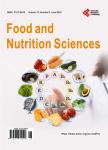Hepatoprotective Effect of Guava (<i>Psidium guajava</i>L.) Leaf Extracts on Ethanol-Induced Injury on Clone 9 Rat Liver Cells
Hepatoprotective Effect of Guava (<i>Psidium guajava</i>L.) Leaf Extracts on Ethanol-Induced Injury on Clone 9 Rat Liver Cells作者机构:Department of Food Science National Pingtung University of Science and Technology Department of Microbiology Immunology and Biophamarceuticals National Chiayi University Department of Tropical Agriculture and International Cooperation National Ping
出 版 物:《Food and Nutrition Sciences》 (食品与营养科学(英文))
年 卷 期:2011年第2卷第9期
页 面:983-988页
学科分类:1002[医学-临床医学] 100214[医学-肿瘤学] 10[医学]
主 题:Guava (Psidium Guajava Linn.) Alcohol-Injured Cell Hepatoprotective Properties Clone 9 Cell Cytotoxicity
摘 要:Guava (Psidium guajava L.), a tropical fruit, belongs to Myrtaceae family. Leaves and fruits of guava have been reported to have an anti-diarrheal, hypoglycemic, lipid lowering, anti-bacterial in addition to antioxidant activities. The aim of this study was to investigate several guava leaf extract cytotoxic effects on healthy clone 9 liver cells and its hepatoprotective effects on ethanol-induced heap-toxicity. It was discovered that when the clone 9 liver cells were treated with guava (Psidium guajava Linn.) extracts for 24 hours, there was no retardation of growth as well as when ethanol and acetone extracts at low concentrations 100 μg/mL and 50 μg/mL were administered however cytototoxic effects were detected at higher concentrations. Water and hot water extracts in concentrations lower than or equal to 500 μg/mL revealed no cytotoxic effects. Injury induction to healthy clone 9 liver cells using 5% alcohol concentration for 30 minutes revealed the hepatoprotective properties of guava (Psidium guajava Linn.) extracts. This was significant in concentrations of 100 μg/mL or lower for ethanol and all concentrations for hot water extracts. Hot water extracts showed higher hepatoprotective and lower cytotoxic properties than other extracts.



